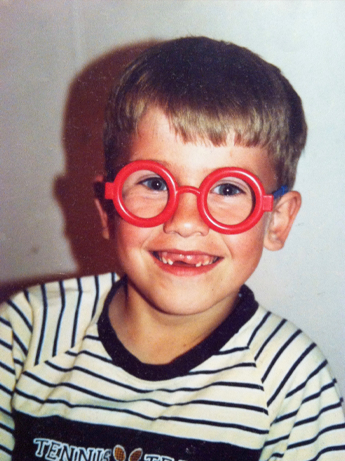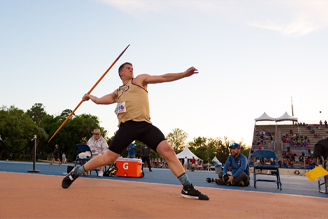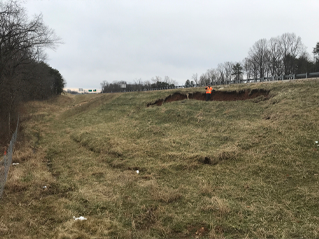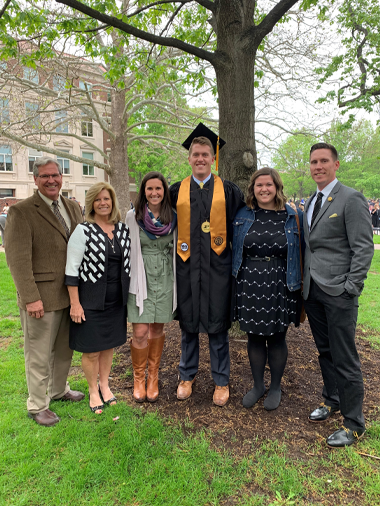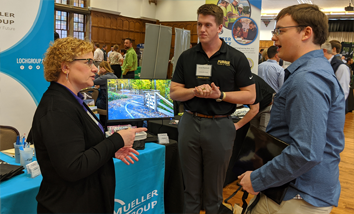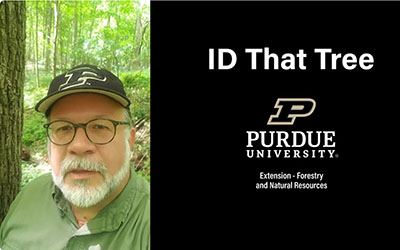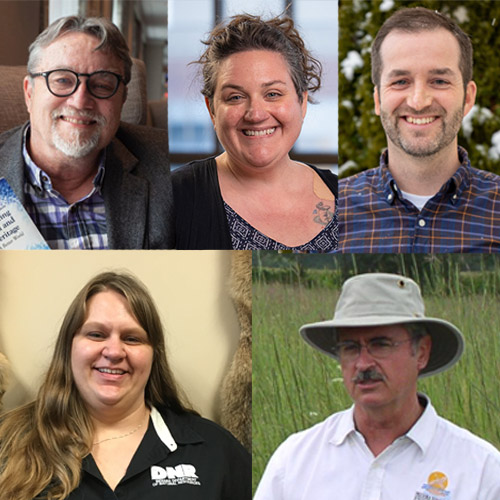Opportunity, Patience, Career Fair Land Foertsch Job
Your big opportunity may be right where you are now.” – author Napoleon Hill.
From his time running around the woods as a child, flipping over rocks trying to find salamanders, creepy crawlies and anything else he could get his hands on, 2019 alumnus Lucas Foertsch has always been interested in the outdoors. An inquisitive nature, time spent with professionals in their respective fields and the investment in learning opportunities outside of the classroom helped him turn that curiosity and passion into a career.
“One of the things my boss said after he hired me was that my previous experience set me apart,” Foertsch, an environmental biologist for the Lochmueller Group, shared. “And a lot of my experience came from my time in FNR, doing heavy field work, and a lot of heavy memorization and species identification. That and my environmental knowledge overall seemed to really stand out to them in my interview.
“My FNR minor and the hands-on experience I received there prepared me for the outside world really well. There is always a learning curve. You have to get your species down for whatever work you are doing and take your focus away from all of the stuff you used to know, but I felt comfortable along the way because of my research experience along with several other internships I obtained through the FNR career fair. They were pretty instrumental in me just kind of rolling right into this career.”
Foertsch packed a lot into his time at Purdue, from throwing javelin for the Purdue track and field team and playing intramural sports to an FNR internship as part of an amphibian study in Dr. Jason Hoverman’s lab to a summer job as an electro fisherman in Muncie, Indiana. But, in the end, it all paid off, preparing him for a dream job that keeps him out in nature most of the time.
“I work for a civil engineering firm and a lot of what we do is mitigation oriented, centering around civil projects, frequently roadways, bridge replacements, and things of that nature,” Foertsch explained. “A lot of our work is through the Indiana Department of Transportation, for example, along I-69, an interstate that runs from Evansville all the way up through Indianapolis. In order to offset the impacts of that project, we have a lot of mitigation zones, especially around Bloomington and Martinsville, where there is a lot of geologic and karst activity. So, to mitigate for that, we have all of these different planted habitats where we pide seed mix of different trees and shrubs, plant them, and then take care of them for the next 10 years or longer. The last couple of weeks (in October) were all tree and shrub counting and species identification, making sure the survival of all of the species is where we want it.
“That is the pretty fantastic part of my job. I didn’t have to sacrifice all of the fun and interesting FNR stuff to come and do a desk job. I get to do all of the tree and bug and leaf identification constantly.”
Foertsch started his time at Purdue as a general biology student in the College of Science. After his sophomore year, he specified to a Triple-E B degree, or ecology, evolution, and environmental biology.
Foertsch’s first experience with the Purdue Forestry and Natural Resources department was the Wildlife in North America class he took as an elective for his wildlife minor. The course, taught by Dr. Jason Hoverman painted a broad view of wildlife in the United States as well as environmental law and ecology’s place in America.
A self-described “nerd,” Foertsch was a big proponent of sitting in the front of the room and really trying to engage with his professors. If they said something interesting, even in passing, he would ask them about it after class. Those conversations helped him build a relationship with Dr. Hoverman and others, which, in turn, led to research and fieldwork opportunities.
“I first met Lucas in 2015 when he was a student in my Wildlife in America course,” Hoverman said. “He was an outstanding student in the class; he excelled in the course and was highly interactive. I’ve taught the course for nine years and he was by far the most engaged student that I ever had in class. Lucas eventually joined the lab and took part in a wide variety of projects. His curiosity and willingness to help out on any task are two things that stood out to me about Lucas. He had great questions about why we were conducting our research and why we did tasks in a certain way. While working in ponds is inherently messy, he always had a smile on his face and an upbeat attitude.”
After spending the spring of his sophomore year performing audio analysis of amphibian call frequencies as a lab tech in the department of biological sciences under Dr. Ximena Bernal, Foertsch worked as a research assistant and field technician at the Purdue Wildlife Area, helping Hoverman capture, identify and study various amphibian species in the summer.
Foertsch expanded his horizons past the Purdue campus and local environment in the summer of 2018, after finding an internship with the Bureau of Water Quality in Muncie, Indiana, through the FNR Career Fair. As a fisheries biologist intern, he identified and cataloged over 60 species of freshwater fish while gaining proficiency in three electrofishing techniques. That fall, he returned to campus and assisted Dr. Elizabeth Flaherty in building nestboxes for her research on flying squirrels.
“Getting to Purdue and seeing these well-established and extremely intelligent professors that had gone and made a life out of this incredibly wonderful career path was inspiring and reassuring,” Foertsch recalled. “It solidified that this is what I wanted to do. I was determined to come in and learn it from them and make it mine and make my own path in it as well.
“I had professors who were ready and willing to give you the chance to get hands-on because they knew that soon your fun time running around doing things at Purdue was going to turn into you finding the job you wanted, chasing it, and needing to be able to earn it. When you get to your job, you don’t have time to call someone and ask them how to do it or borrow someone else’s data, you need to know how to do it on your own. The exposure I had to those types of opportunities at Purdue really helped prepare me for that.”
With all of those experiences in hand, Foertsch still had to work to find the right fit for his talents in the career world. And if it weren’t for a little prep time, a plan, and a lot of patience, he may not have landed at Lochmueller.
Whether you are an underclassman looking for a summer job or an upperclassman looking for a long- time, full-time position, in addition to the basics for job fair attendees, like updating your resume and knowing your elevator pitch – what you are going to say about yourself, Foertsch says it is important to do your homework about who is going to be there. That prep work gave him the determination to keep going when he got discouraged at the job fair his senior year.
“When I went to the FNR career fair and got the job that I have now, there were eight companies looking for people with my kind of background,” Foertsch remembered. “I talked to the first seven of the people on the list and all seven were either doing something I didn’t know how to do or didn’t want to do or they were only looking for part-time employees. I was kind of bummed and I was a little late for track practice, so I was thinking maybe I should get out of there. But I took a deep breath and said ‘You’re already here and you’ve put in the work, you might as well go to the eighth one on the list if there is not a line.’ So I looked over in the corner and there wasn’t a line. I went over there, met with the recruiter and it just went really great. I liked the work that they did and thankfully here I am a year later with a solid job despite everything that is going on.”
Foertsch even came back to the 2020 Purdue FNR career fair as a recruiter for his company bringing things full circle.
“I am an environmental biologist for an ecological consultant as part of a civil engineering firm,” Foerstch said. “I am really proud and happy to have that title. Going through all of the undergrads and working so hard and the whole I was thinking about Steve Erwin and Jeff Corwin and all of those other crazy, awesome wildlife ecologists and conservationists. Then one day you get your first set of business cards at your first job and it says Lucas Foertsch, professional biologist. That makes you feel like I did it, I’m there, even though it is your first day out of college.”
The 2021 FNR Career Fair
In 2021, the FNR Career Fair will be held in conjunction with the College of Ag Career Fair on Friday, Feb. 10 from 9:30 a.m. to 3 p.m. ET. Students can register for the virtual career fair by signing up and logging in at MyCCO.
Students may register at any point leading up to the Career Fair. When they log in the day of the career fair, attendees can join queues for up to three companies and speak with one or more company reps at a time. The career fair software allows them to use whatever video platform they want (Zoom, Teams, WebEx, whichever) and the students are routed there from the main career fair platform.
Purdue FNR and the Office of Student Services also be hosting a preparation room for our students to hang out together, get prepared, and compare notes before and after speaking to the employers.
As of Jan. 7, the FNR Career Fair had 30 companies on its roster from Lochmueller to the Indiana Department of Natural Resources, the Columbian Park Zoo to the Muncie Sanitary District Bureau of Water Quality and even the United States Peace Corps. Several FNR alumni will be representing their respective companies in a recruiting role.
“One thing I see a lot of students doing is worrying about what everyone else is doing … How am I going to compete with this guy who has worked here or how can I expect to get a job if this other person has that GPA, etc.,” Foerstch said. “College is too short to spend your time worrying about what everyone else is doing. You only have four years to get in, learn everything you can, and then when the career fair rolls around you have to show up and show out or you will be left out, wishing you would have been there.”

